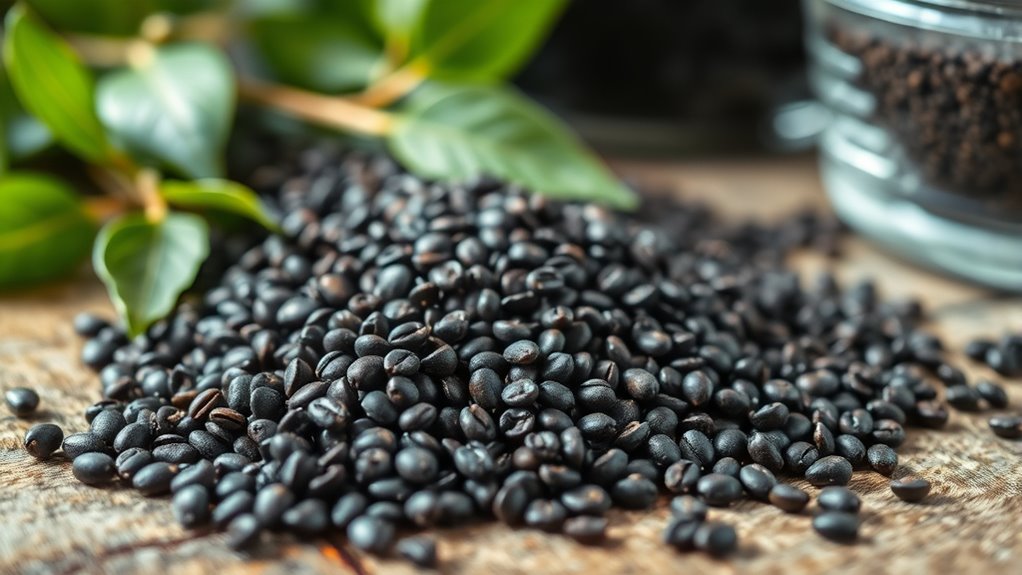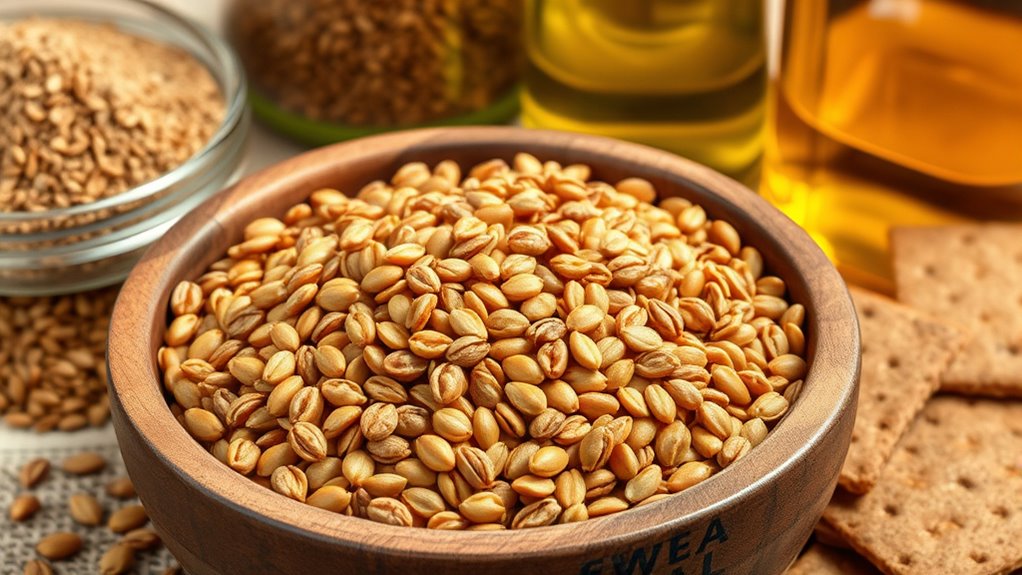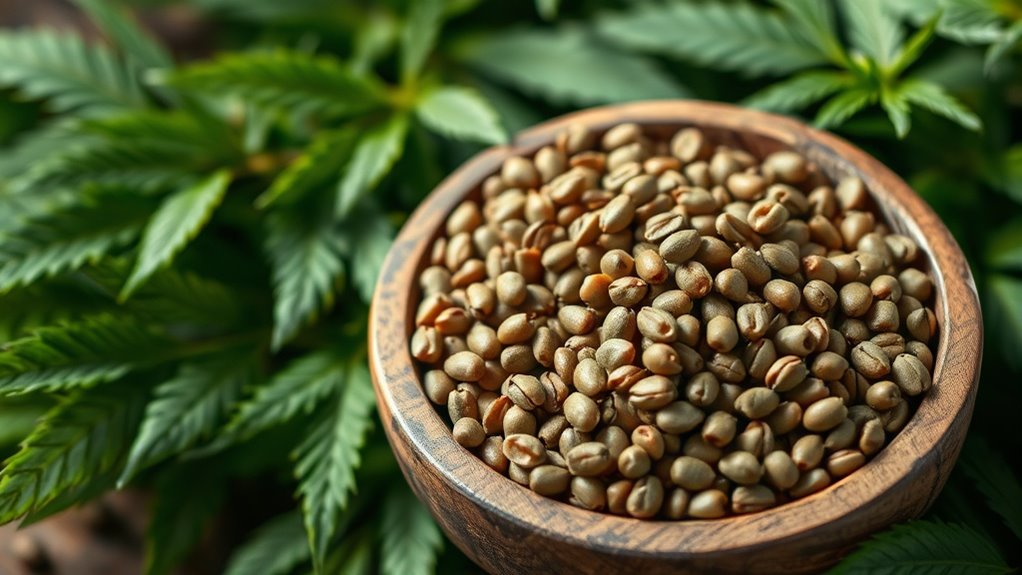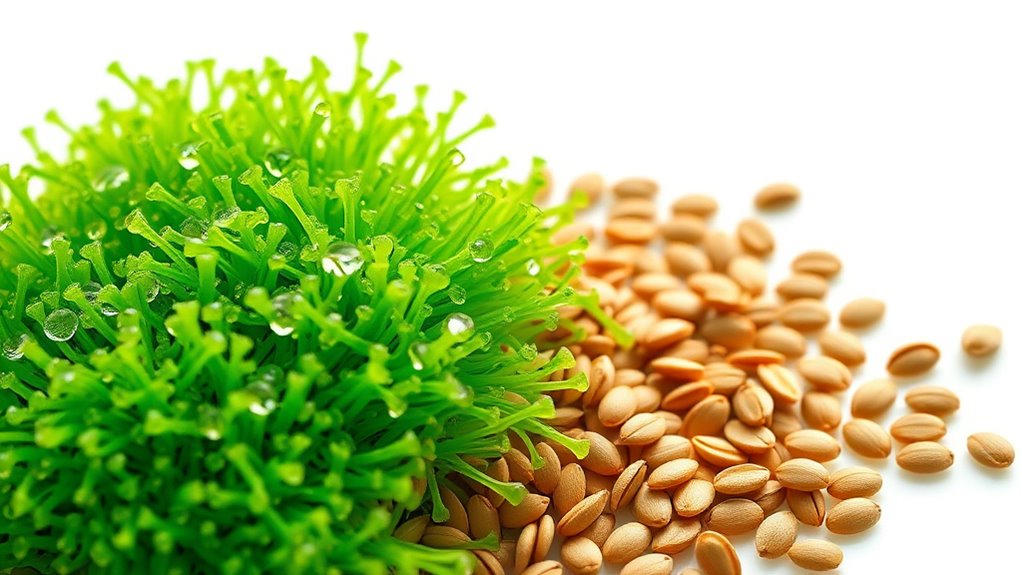If you’re seeking plant-based omega-3 sources that rival fish, options like algal oils, chia seeds, flaxseed, hemp seeds, and walnuts are excellent choices. These foods provide essential EPA, DHA, or ALA, supporting heart health and reducing inflammation without harming marine ecosystems. Sustainable and innovative, they help you maintain a nutritious diet while protecting the oceans. To discover how these sources compare and incorporate them into your meals, you’ll find plenty of helpful insights ahead.
Key Takeaways
- Algal oils provide a concentrated, sustainable source of EPA and DHA, rivaling fish oils in purity and omega-3 content.
- Chia seeds and flaxseeds offer high ALA levels, supporting heart and brain health comparable to fish-derived omega-3s.
- Hemp seeds deliver a balanced mix of omega-3 and omega-6, with complete plant protein, matching fish’s nutritional benefits.
- Seaweed and marine vegetables are eco-friendly, rich in omega-3s, and serve as natural, sustainable alternatives to fish sources.
- Innovative fortified foods and supplements are increasingly available, providing plant-based omega-3s that rival traditional fish oils.
Algal Oils: The Future of Omega-3 Supplements

Algal oils are emerging as a promising and sustainable source of omega-3 fatty acids, especially for those seeking plant-based options. Advances in genetic modification allow scientists to optimize algae for higher omega-3 production, making cultivation more efficient. Marine farming of algae offers a controlled environment, reducing overfishing concerns associated with fish oil sources. These methods guarantee a steady, eco-friendly supply of omega-3s that doesn’t depend on wild fish populations. You benefit from a pure, concentrated form of EPA and DHA, essential for your health, without harming marine ecosystems. Additionally, sustainable farming practices help minimize environmental impact and promote ecological balance. As research progresses, algal oils become increasingly affordable and accessible, positioning themselves as the future of plant-based omega-3 supplements. This innovative approach combines sustainability with scientific innovation, offering a reliable alternative to traditional fish oils.
Chia Seeds: Tiny Powerhouses of Healthy Fats

Although small in size, chia seeds pack a powerful nutritional punch, especially when it comes to healthy fats. Their seed nutrition includes a high concentration of omega-3 fatty acids, making them an excellent plant-based source. When you perform a fats analysis, you’ll find that chia seeds contain about 3.5 grams of omega-3s per ounce, primarily alpha-linolenic acid (ALA). This healthy fat supports heart health, reduces inflammation, and boosts brain function. Plus, their fiber and protein content complement the fats, enhancing overall nutrition. Chia seeds are versatile—you can sprinkle them on yogurt, blend into smoothies, or add to baked goods. Their tiny size belies their impressive ability to deliver essential fatty acids, making them a nutrient-dense choice for plant-based omega-3 intake.
Flaxseed and Its Derivatives for Heart Health

Flaxseed is a rich source of omega-3 fatty acids that can support your heart health. Regularly including flax derivatives may help lower the risk of heart disease and improve overall cardiovascular function. You can easily add ground flaxseed or flaxseed oil to your diet for these benefits. Embracing sustainable living can make incorporating plant-based omega-3 sources like flaxseed even more accessible and environmentally friendly.
Omega-3 Content in Flax
Flaxseeds are a rich source of alpha-linolenic acid (ALA), a plant-based omega-3 fatty acid known for supporting heart health. The omega-3 content in flax varies depending on the quality and preparation, but generally, a tablespoon offers about 1.6 grams of ALA. Your body’s ability to absorb omega-3 from flaxseed depends on how you process it; ground flaxseed allows for better omega-3 absorption compared to whole seeds. Flaxseed cultivation is widespread, making it a sustainable, accessible source of omega-3s. Growing conditions influence nutrient levels, so choosing high-quality, fresh flaxseed ensures maximum omega-3 benefits. Incorporating ground flax into your diet is an effective way to boost omega-3 intake naturally, supporting overall cardiovascular health. Additionally, understanding the best beaches can provide a relaxing environment to enjoy outdoor activities that complement a healthy lifestyle.
Heart Disease Prevention Benefits
Consuming flaxseed and its derivatives can substantially reduce the risk of heart disease. These foods are rich in alpha-linolenic acid (ALA), a plant-based Omega 3 that supports cardiovascular health. If you’re not getting enough Omega 3 from your diet, Omega 3 supplements made from flaxseed can be an effective substitute. Regular intake of flaxseed helps lower blood pressure, reduce inflammation, and improve cholesterol levels—all key factors in decreasing heart disease risk. Incorporating flaxseed into your meals or taking supplements ensures you’re actively supporting your heart health. By including these plant-based Omega 3 sources, you can make meaningful strides toward heart disease prevention without relying solely on fish or fish oil supplements.
Incorporating Flax Derivatives
To boost your heart health, incorporating flax derivatives like ground flaxseed, flaxseed oil, or flaxseed meal into your daily routine is an effective strategy. Flax oil provides a concentrated source of omega-3 fatty acids, supporting cardiovascular function. Flax protein offers a plant-based alternative to animal proteins, helping reduce cholesterol levels. You can add ground flaxseed to smoothies, oatmeal, or salads. Use flaxseed oil as a dressing or in smoothies for a quick omega-3 boost. Flax protein powders are versatile for shakes or baked goods. Additionally, flax derivatives are high in nutrients, which are essential for overall health. Below is a table highlighting key flax derivatives:
| Flax Derivative | Benefits |
|---|---|
| Flax Oil | Rich in omega-3, heart health |
| Flaxseed Meal | Fiber, omega-3, versatile in recipes |
| Flax Protein | Plant-based protein, cholesterol support |
| Ground Flaxseed | Easy to incorporate, nutrient-dense |
| Flaxseed Oil | Concentrated omega-3 source |
Hemp Seeds: A Complete Plant-Based Omega-3 Source

Hemp seeds stand out as a complete plant-based source of omega-3 fatty acids, providing all essential fatty acids your body needs. They boast impressive seed nutrition, offering a balanced mix of omega-3 and omega-6 fats that support heart health and reduce inflammation. Unlike some plant sources, hemp seeds contain a favorable ratio of these fats, making them highly effective. Plus, they are rich in plant protein, delivering all nine essential amino acids, which helps with muscle repair and immune function. You can easily incorporate hemp seeds into your diet by sprinkling them on salads, blending into smoothies, or adding to oatmeal. Their versatile nature makes them an excellent addition for anyone seeking a complete, plant-based omega-3 source. Additionally, hemp seeds are often used in hybrid/combination units for improved nutritional benefits, highlighting their comprehensive health advantages.
Walnuts and Other Nut Varieties Rich in ALA

Walnuts are an excellent source of plant-based omega-3s, specifically alpha-linolenic acid (ALA). Besides walnuts, other nuts like chia seeds and flaxseeds also pack significant amounts of ALA. Incorporating a variety of these nuts into your diet can boost your omega-3 intake naturally. Additionally, Halloween costume options for teens can make your celebrations more fun and memorable.
Healthy Omega-3 Content in Walnuts
If you’re looking to boost your omega-3 intake through plant-based sources, walnuts stand out as a top choice because of their high content of alpha-linolenic acid (ALA). Not only do they provide healthy fats, but they also contain walnut antioxidants that help protect your cells. These antioxidants support your overall health and can enhance omega-3 absorption, making the nutrients more effective. Walnuts are a convenient snack and versatile addition to meals, offering a rich source of plant-based omega-3s. Their balanced profile helps improve heart health and reduce inflammation. Incorporating walnuts into your diet is an easy way to maximize omega-3 benefits naturally. Remember, their unique combination of ALA, antioxidants, and bioavailability makes walnuts a smart choice for plant-based omega-3 intake. Additionally, understanding cookie categories can help you manage your online privacy while researching health benefits.
Variety of Nut Options Rich in ALA
While walnuts are among the most well-known sources of plant-based ALA, several other nuts also contribute valuable omega-3s to your diet. Almonds, pecans, and chia seeds offer additional options to diversify your nutrient intake. You can create tasty nut pairings and flavor combinations by mixing walnuts with dried fruits or roasting almonds with herbs, enhancing both taste and omega-3 content. Incorporating a variety of nuts ensures you get a broader spectrum of nutrients while maintaining interest in your meals. These nuts can be added to salads, oatmeal, or snack mixes, making it easy to boost your ALA intake naturally. By experimenting with different nut varieties and flavor combinations, you make your plant-based omega-3 sources more enjoyable and effective. Exploring nut selection can help maximize your omega-3 benefits and keep your diet interesting.
Seaweed and Marine Vegetables as Sustainable Options

Have you considered how seaweed and marine vegetables offer a sustainable alternative to traditional omega-3 sources? These plants grow rapidly and require minimal resources, making sustainable harvesting easier and less damaging to ecosystems. They don’t rely on freshwater or fertilizers, reducing environmental strain. Plus, harvesting seaweed can actually help maintain healthy ocean ecosystems by controlling algae overgrowth and supporting biodiversity. Additionally, seaweed farming can serve as a diverse and eco-friendly method of aquaculture that benefits both the environment and local communities.
Innovative Food Products Enriching Plant-Based Omega-3s

Innovative food products are transforming the way we incorporate plant-based omega-3s into our diets. Thanks to plant-based innovation, manufacturers are developing products that boost omega-3 content without relying on fish oils. These advancements include fortified foods like cereals, snacks, and beverages that naturally contain or are enriched with omega-3s derived from algae or seeds. Such products support dietary sustainability by reducing dependence on marine resources and lowering environmental impact. By choosing these innovative options, you can easily meet your omega-3 needs while contributing to eco-friendly practices. These advancements make plant-based omega-3s more accessible and appealing, helping you maintain a healthy, sustainable diet without sacrificing flavor or nutrition.
Frequently Asked Questions
How Do Plant-Based Omega-3 Sources Compare in Absorption to Fish?
You might wonder about Omega 3 bioavailability when comparing plant vs fish absorption. Generally, fish sources provide EPA and DHA directly, making absorption easier. Plant-based sources, like flaxseed and algae, contain ALA, which your body converts to EPA and DHA but less efficiently. However, high-quality plant sources, especially algae oils, can rival fish in absorption and provide essential Omega-3s, making them a good alternative if you prefer plant-based options.
Are There Any Side Effects From Consuming High Amounts of Plant Omega-3s?
If you consume high amounts of plant omega-3s, you might experience digestive concerns like bloating or diarrhea. While generally safe, excessive intake could also lead to nutrient interactions, such as affecting blood clotting or impairing absorption of other nutrients. It’s best to enjoy these sources in moderation and consult a healthcare professional if you notice any adverse effects, ensuring you maintain a balanced, healthy diet.
Can Vegans Meet Their Omega-3 Needs Without Supplements?
You can definitely meet your omega-3 needs without supplements by choosing rich plant sources like chia seeds, flaxseeds, and walnuts. Many believe in Omega 3 supplement myths, but vegan omega-3 sustainability is strong with these options. Incorporating a variety of these foods into your diet guarantees you get sufficient omega-3s naturally, supporting overall health without relying on supplements.
What Is the Recommended Daily Intake of Plant-Based Omega-3s?
You should aim for about 250-500 milligrams of EPA and DHA daily, according to dietary guidelines. Since your body’s omega-3 metabolism isn’t very efficient at converting plant-based ALA into these forms, it’s important to include sources like flaxseeds, chia seeds, or algae supplements. Regular intake helps support heart, brain, and eye health, ensuring you meet your omega-3 needs through a balanced, plant-based diet.
How Long Does It Take to See Health Benefits From Plant Omega-3s?
Imagine planting a seed today, knowing growth takes time. Similarly, your body needs weeks to months to see benefits from plant omega-3s. The time depends on omega-3 conversion and plant absorption rates—typically, you might notice improved energy or skin health within 4-8 weeks. Consistent intake guarantees your body absorbs these nutrients efficiently, gradually revealing their full potential for your overall well-being.
Conclusion
Did you know that plant-based omega-3 sources can provide up to 60% of the omega-3s found in fish? With options like algal oils, chia seeds, and walnuts, you can support heart health and sustainability without fishing. Incorporate these nutrient-rich foods into your diet and enjoy the benefits of healthy fats. Making the switch not only benefits your well-being but also helps protect our oceans for future generations.









